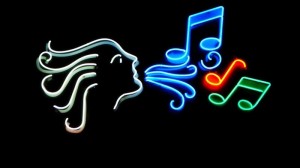Evil entered this world through a song. It was the jazz cats doing. Not the rockers or the folkies, or the classical cats, or the ones with the blues. It was the jazz cats. It happened a long time ago, before the birth of the cool. Jazz cats gathered from all over the world to have a good time and to participate in what they called cutting contests. At this particular cutting contest the jazz cats were trying to see who could come up with the meanest, the baddest and the scariest sounding thing. Some cats were blowing on two horns at once. Others were playing as high and as low as possible. Some were playing as fast as possible and others were playing flatted fifths – “the devils interval”. It must have been fun to watch.Finally, there was one cat left who hadn’t done anything. No one knew where this cat came from, whether this cat was male or female, or whether they had anything to say.
It just so happened that this cat came with words in a song.
Unfortunately, this song was the most awful thing, full of hate and blood and grotesqueness all the way through. When finished, all the other cats decided that this cat had won the cutting contest and that they had just heard the meanest, the scariest, and the baddest thing. What’s more, they unanimously agreed that the song and its words had no place in their world and that it should be taken back! The cats were doing fine with their sounds and without this new tale of terror in their lives so they asked the cat to call the song back. But of course, like with all tales, once it is told it is forever released into the world – it could not be called back.
I paid close attention to the form and content of Thomas King’s retelling of Leslie Silko’s story in order to respect the stories theme when I made it my own. I decided to stay close to this telling, even borrowing some words and phrases from King so that I could change the setting and the characters without straying from the message. I began by taking notes on the stories flow and content. After reading through my notes, I told the story to my friend in my own words, adding the jazz narrative for some fun. Then I wrote out the above version of the story. This is close to the process that a jazz musician might learn another persons solo and change it to make it their own. Theme and variation. I used the jazz narrative because the image of the witches competing and having a good time in a cave called to mind the jazz worlds cutting contests where each jazz cat tries to outdo the other. In my mind, this cutting contest takes place “way back when” and it has very little to do with modern music, but rather the idea and spirit of jazz. I made sure that the winner of the cutting contest used words instead of sounds to tell the scariest story so that I could communicate the indelible power of story. The irreversibility of the spoken word.
Works Cited
“The Devils Interval.” Cranach: christianity, culture, vocation. N.p., 27 July. 2011. Web. Jan 25. 2014.
“The Jazz Evangelist: jazz gladiators and cutting sessions.” music.cbc.ca. cbc., 21 Jan. 2013. Web. Jan 25. 2014.
“Jazz Lives”. Jazz Lives. N.p., 14 Nov. 2010. Web. Jan 25. 2014.
King, Thomas. The Truth About Stories: A Native Narrative. Toronto: House of Anansi Press Inc., 2003. Print


Paul, I love this take on the story. Not sure if you play jazz music or anything, but this reads like you do. I think I like it so much because, as I understand, jazz was a very subversive art form in the 1920s, 1930s, etc. So the idea that this new, subversive, anti-establishment art form brought evil into the world in the form of unscripted, unbridled expression kind of turns the idea of ‘evil’ on its head. Cheers, Jamie
Hi Jamie and Erika ,Thank you for the comments and encouragement. I had a great deal of fun connecting an art form that I love so much to this story. I know that a lot of jazz musicians and fans thought that the Beatles brought evil with them when they came to America. I thought about writing about how a rock and roll musician came to overpower jazz with its evil popularity, but I didn’t want to blame the Beatles in my retelling of the story-their words are far too happy to represent real evil anyway.
Hi Paul – a fantastic re-telling of King’s tale – and yes, I agree with Jamie, you have certainly turned something on its head — not sure if it is evil or not? Thank you, you are an excellent re-teller of tales ;0